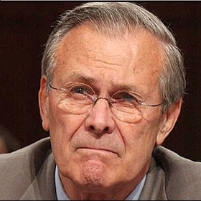Breaking the Law: Bush Officials Feel the Heat
Wednesday, December 10, 2008

With so much attention centering on the developing financial crisis, it isn’t surprising that other important stories have slipped through the cracks. Nevertheless, as the Bush administration winds down, there has been a surprising flurry of activity regarding its use of torture and illegal imprisonment.
The Supreme Court has agreed to hear two terror-related cases. One involves Ali Saleh Kahlah al-Marri, a Bradley University student who was detained as a “material witness” in December 2001 and has been held without charge ever since. The al-Marri case challenges the right of the President of the United States to imprison a legal resident without charge and to detain anyone in the U.S. at the president’s own discretion. The other case, concerning a lawsuit filed by Javaid Iqbal, a Pakistani who was tortured and then deported without charge, deals with whether former attorney general John Ashcroft and former FBI director Robert Mueller can be considered as defendants in the lawsuit Iqbal has filed relating to his mistreatment.
Five men accused of being involved in the planning of the 9/11 attacks have asked to plead guilty. They are having second doubts after learning that their pleas might interfere with their desire to be executed. However, if this obstacle can be cleared up, this would appear to be a win/win situation…if you happen to be either a terrorist seeking martyrdom or a Bush official who authorized the torture of the accused and would prefer that testimony regarding the torture not surface in a trial.
Meanwhile, in the case of Canadian Omar Khadr, who was 15 years old when he was captured in Afghanistan after a firefight that killed an American soldier, the U.S. government has withdrawn as a witness a special agent who was scheduled to testify whether torture was used to extract Khadr’s confession.
A New York federal appeals court heard arguments on December 9 in the case of another Canadian, Maher Arar, who was snatched by U.S. authorities at John F. Kennedy Airport in New York in September 2002 and sent to Syria, where he was tortured before being released 10 months later when it was determined that he was innocent. Arar wants to be able to sue the U.S. government for damages.
And, in a new book, Michael Ratner of the Center for Constitutional Rights, lays out the case for trying 14 administration officials for war crimes, including Donald Rumsfeld, George Tenet, Alberto Gonzales, David Addington and generals Geoffrey Miller and Ricardo Sanchez.
Finally, a group of musicians, including the group Massive Attack and Tom Morello, formally of Rage Against the Machine, are protesting the use of their music by the U.S. military to drive prisoners crazy at Guantánamo and other prisons.
There will no doubt be pressure brought to bear against Barack Obama, once he assumes the presidency, to ignore the Bush administration’s violations of U.S. law and “move on.” But holding Bush officials to account is not about revenge; it’s about sending a warning to Obama and other future U.S. presidents that no matter how powerful they are, no American is above the law.
-David Wallechinsky
Ali Saleh Kahlah al-Marri (Brennan Center for Justice)
Who’s at Fault for Harsh Anititerror Tactics? (by Warren Richey, Christian Science Monitor)
Alleged 9/11 Plotters Offer to Confess at Guantánamo (by William Glaberson, New York Times)
Witness Against Omar Khadr Withdrawn (by Colin Perkel, Canadian Press)
Court Weighs Extraordinary Rendition Case (by Dina Temple-Raston, NPR All Things Considered)
The Trial of Donald Rumsfeld (by Michael Ratner, Center for Constitutional Rights)
Musicians Protest Use of Songs by US Jailers (by Andrew O. Selsky, Associated Press)
- Top Stories
- Unusual News
- Where is the Money Going?
- Controversies
- U.S. and the World
- Appointments and Resignations
- Latest News
- Musk and Trump Fire Members of Congress
- Trump Calls for Violent Street Demonstrations Against Himself
- Trump Changes Name of Republican Party
- The 2024 Election By the Numbers
- Bashar al-Assad—The Fall of a Rabid AntiSemite






Comments